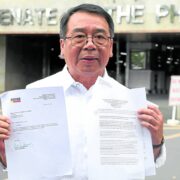Prioritize DICT in 2026 budget

The government spends some P12 billion a year on cloud services, with 90 percent of its data stored mainly in Singapore. This was disclosed at the House budget deliberations last Sept. 30, and the Department of Information and Communications Technology (DICT) and legislators all agree that this is a potential national security risk as sensitive information is kept outside the government’s jurisdiction.
The term “cloud services” refers to activities such as data storage done through the internet. These are provided by companies such as Google, Amazon, and Microsoft, which own the computer servers that host the data of its clients. While it has the benefit of storage and access to data without the government having its own computer servers, storing sensitive information on foreign cloud services exposes the Philippines to financial and security risks. For instance, a foreign government can compel cloud service providers to disclose data stored in its country even if these belong to a foreign government. Experts cite this as among the risks that endanger the government’s ability to maintain data sovereignty and protect its citizens’ privacy.
At the same House hearing, the DICT said it is addressing this by seeking P2.5 billion for the construction of three major data centers as part of a three-year plan to put up nine facilities with a combined cost of P7.5 billion. The DICT’s budget sponsor, FPJ Panday Bayanihan party list Rep. Brian Poe Llamanzares, explained that the investment will help address the security concerns and at the same time generate savings for the government.
Limited funding
The DICT has noted that investing P7.5 billion in nine data centers to develop on-premises data centers will ultimately be cheaper than continuing with the recurring cloud service costs. “DICT’s request for capital outlay for infrastructure development is badly needed and urgently needed in terms of timing because we’re trying to catch up to where the rest of the world is,” Llamanzares added.
What is so disappointing is that the DICT had requested for similar funding in the past to finance efforts by the government to establish data centers in the country. The DICT said that not a single facility has been built to date due to limited funding. In 2024, the DICT submitted a proposed allocation of P2.3 billion for data center management, but the Department of Budget and Management approved only P750 million.
In contrast, as what is being uncovered in the ongoing investigations of anomalous flood-control projects, tens of billions of pesos allocated to the Department of Public Works and Highways (DPWH) have gone to substandard or “ghost” infrastructure projects and lined up the pockets of government officials, private contractors, and some lawmakers.
Worldwide trend
This is another tragic case of misaligned government priorities. Considering that the worldwide trend is toward digitalization, funding for the DICT has remained small, although a big part of the blame is on the agency itself, which has been struggling to use the budget it is given. In 2019, for example, the Commission on Audit flagged the DICT for using only P1.2 billion of its P6.2-billion allocation for the year, or a “very low fund utilization rate” of only 19.51 percent. This improved to 60 percent in 2023, and 87 percent in 2024. The DICT noted that as of August this year, its budget usage was at only 41 percent, although it expects this to rise to 97 percent with the rollout of major projects such as the free Wi-Fi program by the end of this year.
A source of funding that has presented itself is the P255.5 billion intended for the DPWH’s flood-control projects next year that President Marcos ordered realigned to priority programs of other government agencies after the discovery of nonexistent or substandard projects.
Cybercrime prevention
The DICT has a lot on its plate. It lists its flagship undertakings to include the national broadband program, free Wi-Fi for all, the eGovPH app, the Bayanihan SIM initiative, and enhanced cybersecurity measures, “all aimed at building a connected, secure, and future-ready digital nation.” It is also tasked to strengthen cybercrime prevention, safeguard citizens’ data privacy rights, and regulate and expand telco services through the National Telecommunications Commission.
For the country to achieve its national digitalization goals, Congress must fully support the DICT by reallocating part of the DPWH budget to fund the DICT’s various programs, including the establishment of big data centers to host sensitive and other data here.
However, giving it money to construct data centers will not be enough. The agency must also be given additional funding to hire the necessary people to run those data centers. Otherwise, we will only see a repeat of the health facilities enhancement program of the Department of Health, where 400 of the 600 centers built over the past 10 years remain idle due to lack of personnel.





















